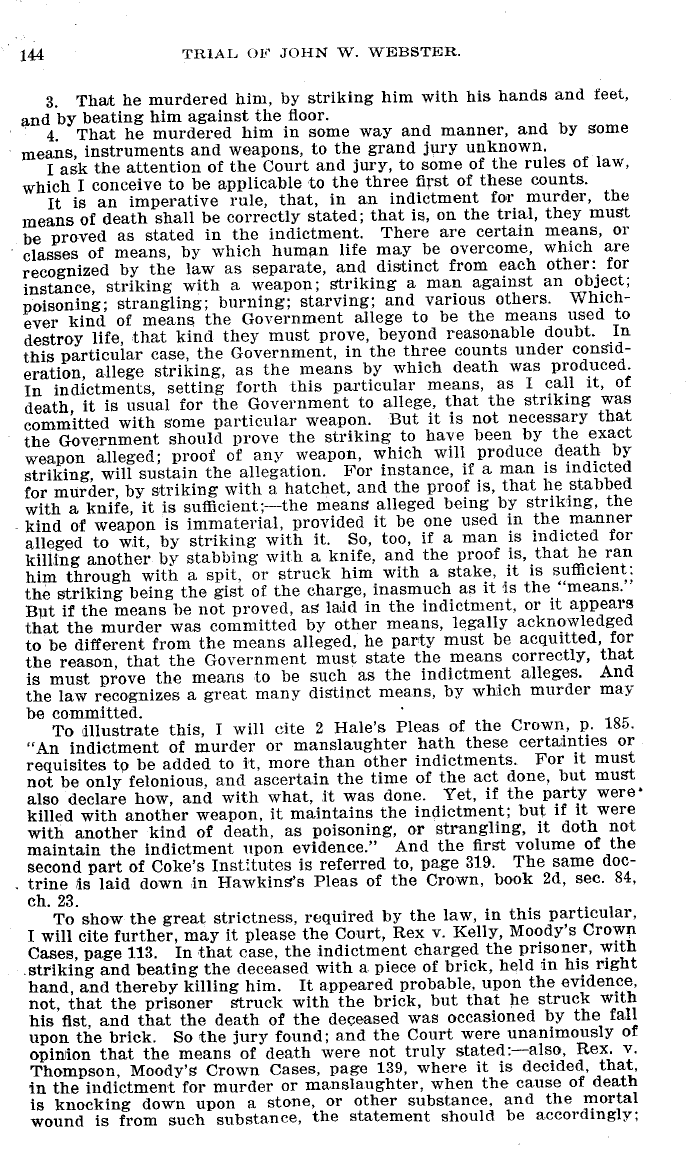|
j¢¢ TRIAL Ox!' JOHN W. WEBSTER.
3. That he murdered him, by striking him with his hands and feet,
and by beating him against the floor.
4. That he murdered him in some way and manner, and by some
means, instruments and weapons, to the grand jury unknown.
I ask the attention of the Court and jury, to some of the rules of law,
which I conceive to be applicable to the three first of these counts.
It is an imperative rule, that, in an indictment for murder, the
means of death shall be correctly stated; that is, on the trial, they must
be proved as stated in the indictment. There are certain means, or
classes of means, by which human life may be overcome, which are
recognized by the law as separate, and distinct from each other: for
instance, striking with a weapon; striking a man against an object;
poisoning; strangling; burning; starving; and various others. Which-
ever kind of means the Government allege to be the means used to
destroy life, that kind they must prove, beyond reasonable doubt. In
this particular case, the Government, in the three counts under consid-
eration, allege striking, as the means by which death was produced.
In indictments, setting forth this particular means, as I call it, of
death, it is usual for the Government to allege, that the striking was
committed with some particular weapon. But it is not necessary that
the Government should prove the striking to have been by the exact
weapon alleged; proof of any weapon, which will produce death by
striking, will sustain the allegation. For instance, if a man is indicted
for murder, by striking with a. hatchet, and the proof is, that he stabbed
with a knife, it is sufficient; the means alleged being by striking, the
kind of weapon is immaterial, provided it be one used in the manner
alleged to wit, by striking with it. So, too, if a man is indicted for
killing another by stabbing with a knife, and 'the proof is, that he ran
him through with a spit, or struck him with a stake, it is sufficient:
the striking being the gist of the charge, inasmuch as it is the "means."
But if the means be not proved, as laid in the indictment, or it appears
that the murder was committed by other means, legally acknowledged
to be different from the means alleged, he party must be acquitted, for
the reason, that the Government must state the means correctly, that
is must prove the means to be such as the indictment alleges. And
the law recognizes a great many distinct means, by which murder may
be committed. '
To !illustrate this, I will cite 2 Hales Pleas of the Crown, p. 185.
"An indictment of murder or manslaughter bath these certainties or
requisites to be added to it, more than other indictments. For it must
not be only felonious, and ascertain the time of the act done, but must
also declare how, and with what, it was done. Yet, if the party were
killed with another weapon, it maintains the indictment; but if it were
with another kind of death, as poisoning, or strangling, it doth not
maintain the indictment upon evidence." And the first volume of the
second part of Coke's Institutes is referred to, page 319. The same doc-
trine is laid down in Hawking's Pleas of the Crown, book 2d, sec. 84,
ch. 23.
To show the great strictness, required by the law, in this particular,
I will cite further, may it please the Court, Rex v. Kelly, Moody's Crown
Cases, page 113. In that case, the indictment charged the prisoner, with
striking and beating the deceased with a. piece of brick, held an his right
hand, and thereby killing him. It appeared probable upon the evidence
not, that the prisoner struck with the brick, but that he struck with
his fist, and that the death of the deceased was occasioned by the fall
upon the brick. So the jury found; and the Court were unanimously of
opinion that the means of death were not truly stated:-also, Rex. v.
Thompson, Moody's Crown Cases, page 139, where it is decided, that,
in the indictment for murder or manslaughter, when the cause of death
is knocking down upon a stone or other substance, and the mortal
wound is from such substance, the statement should be accordingly;
|

